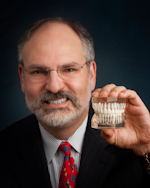Summer is over, and fall is here. I hope you had a great summer doing the things you love to do and recharging for the final months of 2023. Coming back to our basic principles is so important, and grounding ourselves helps so much to move forward.
To be an accomplished dentist requires many skills—clinical, business, and interpersonal—that all have to blend and balance together.
We all have to work smart. That means not repeating unnecessary steps because time is your most valuable asset. Delegating tasks doesn’t mean giving up responsibility; it means doing what is necessary to get the job done right. If you have to do things over, you are losing money—so you want to get the job done right the first time. Thinking on what outcome you want before you start will really help.
Working smarter
Many people will work six days a week, 10 hours a day, and have little to show for it—and why is that? Have you ever really looked at how you work in your dental office? I would go into an office to help someone and watch them change 10 burs to do a crown prep and they would ask me “Why is this taking so long?” My surgical mentor, Dr. Earl Slusky, would say, “Pick up your handpiece and put it down when finished.”
He was not saying be reckless; he was saying be efficient. The “60-second crown prep” isn’t about being fast; it’s about being productive. A simple question: do you use sharp dental burs that are new? Another question might be: do you move clockwise or counterclockwise when preparing a crown?
You might also be interested in: Are you the right leader for your staff?
To illustrate more efficient processes, here’s a hypothetical crown prep: after you’ve greeted your patient and have agreed on treatment, can you get that patient comfortably numb on the first attempt or do you have to numb again? When you return after the hygiene exam, has the counter model been taken or scanned and do you have what you need to make your temporary?
You can prepare the crown and take your impression because you managed the tissue using a simple method for blood control, and while the impression is setting, you can do something else as simple as writing your clinical notes. Making your temp should take only minutes if you have a preoperative impression and are using a fast-setting temporary material. You can take the shade before the tooth dries out before you start anything, and the materials you use to control the bleeding act as your bite registration.
When cementing your temp, use a cement that will hold the temp crown; we don’t want the patient to have to return for a recement of the temp. We all know how to do this—we just have to keep productivity top of mind.
Give back to achieve balance
Are you volunteering in your community? Giving back is a wonderful way to spend time with your spouse and teach valuable lessons to your children. There are so many ways to do this through community groups, places of worship, sports leagues, and more.
Many dental professionals will say that they work so hard at the office, they have little time for other things. This is wrong, and I learned it the hard way. I thought if I worked 24/7, everything would be great with my family. But my family needed me to be present in their lives. We all know this, and we have to do it.
Your practice is about integrity and honesty along with hard work, being patient centered, and offering great service. Being available and nice goes a long way, but such dedication also means dedication to yourself and your family.
Balancing art, science, and business isn’t always easy. But if you work productively and with a great team, you can achieve that balance.
Editor's note: This article appeared in the October 2023 print edition of Dental Economics magazine. Dentists in North America are eligible for a complimentary print subscription. Sign up here.







